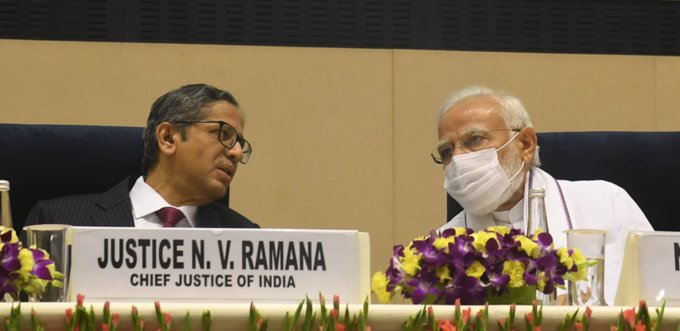Last Updated on April 30, 2022 6:42 pm by INDIAN AWAAZ

AMN / NEW ELHI
Chief Justice of India (CJI) N V Ramana today said that the Constitution provides separation of power among the three organs of the state and while discharging duty, one should be mindful of ‘Lakshman Rekha’.
Speaking at the Joint Conference of Chief Ministers and Chief Justices of High Courts, Ramana said deliberate inaction by governments despite judicial pronouncements is not good for the health of democracy.
Prime Minister Narendra Modi inaugurated the joint conference.
CJI termed governments as the “biggest litigants”, accounting for nearly 50 per cent of pending cases, saying the “docket explosion” is due to non-performance of various wings of the executive and the legislature not realising its full potential.
While dealing with the reasons for docket explosion, the CJI referred to the growing number of contempt cases arising out of defiance of judicial orders by the executive and said that “deliberate inactions by governments, despite judicial pronouncements, are not good for the health of democracy”.
“Constitution provides separation of power among three organs and the harmonious function between three organs strengthens democracy. While discharging our duty, we should be mindful of Lakshman Rekha,” he said.
Voicing concern over misuse of PILs, the CJI said it has now turned into “Personal Interest Litigation” and is used to settle personal scores.
Mr. Modi said this while addressing the inaugural session of the Joint Conference of Chief Ministers of the States and Chief Justices of High Courts in New Delhi.
The Prime Minister said, the government considers the possibilities of technology in the judicial system as an essential part of the Digital India Mission. He said, the e-courts project is being implemented in mission mode in the country.
Mr Modi said, the Judiciary is the guardian of the Constitution and the Legislature represents the aspirations of the citizens adding that this balance will prepare the roadmap for an effective and time-bound judicial system in the country.
The Prime Minister stressed that 75 years of Independence have clarified the roles and responsibilities of both the judiciary and the executive. He added that this relation has evolved wherever necessary to give direction to the country. Mr. Modi said, in this ‘Amrit Kaal’, the country’s vision should be for a judicial system where justice is easily available, quick and for everyone.
Mr Modi said, in 2015, the Centre identified about 1,800 laws which have become irrelevant. Out of these, 1,450 laws were abolished. He said that only 75 such laws have been abolished by the states and urged the states to look into it.
Talking about under-trial prisoners, the Prime Minister said, today there are about 3.5 lakh such prisoners in the country. He said, most of them are from poor or ordinary families and urged the Chief Ministers and Chief Justices of High Courts to give priority to their cases.
